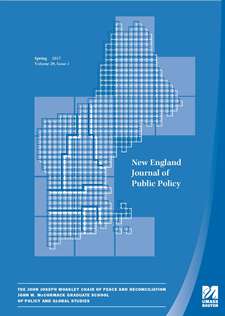Volume 29, Issue 1 (2017)
Such is the unpredictability of Trump’s streaming executive orders that much of what I write may be irrelevant by the time this issue of the New England Journal of Public Policy goes to press. But the articles in this issue will not lose their pertinence, no matter what the administration does. Indeed, given its predilection for “alternative facts,” they assume a greater relevance and consequential significance.
This issue of the journal has three parts. The first part had its origins in a conference on extremism held at the Center for Study of Intractable Conflicts (CRIC), Harris Manchester College Oxford in October 2015; the second comprises four articles on conflicts referred to as “intractable”—Colombia, Syria, and Israel/Palestine—and a reflection on the Holocaust; the third is a stand-alone, one article that addresses the leadership attributes necessary to crack the iron walls of intractability.
Front Matter
Editor's Note
Editor's Note
Padraig O’Malley
Articles
Why We Have the Center for the Resolution of Intractable Conflict in Oxford
John, Lord Alderdice
Understanding the Appeal of ISIS
Lydia Wilson
The Growth of ISIS Extremism in Southeast Asia: Its Ideological and Cognitive Features—and Possible Policy Responses
Kumar Ramakrishna
The Apocalyptic Imagination and the Fundamentalist Mindset
Charles B. Strozier
Suicide Terrorism: Performance Violence as Public Plunge
Gregory Saathoff
What Is the Colombian Peace Process Teaching the World?
Andrés Ucrós Maldonado
Geographies of Absence: Radicalization and the Shaping of the New Syrian Territoriality
Omar Abdulaziz Hallaj
Israel and Palestine: The Demise of the Two-State Solution
Padraig O’Malley

Editors
- Editor
- Padraig O'Malley
- Managing Editor
- Nancy Riordan
- Copy Editor
- Debby Smith